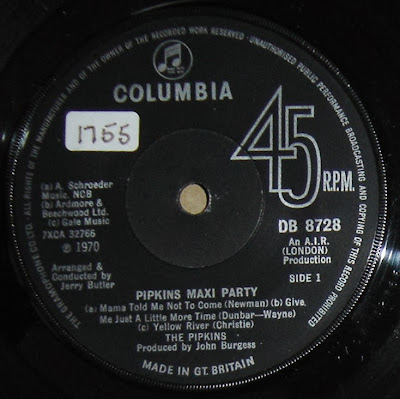Label: Creation
Year of Release: 1985
This entry has largely been triggered by me uncovering a review of Creation's first fifty singles over on the mothballed Stylus Magazine website. In this particular retrospective, the resident critic Todd Hutlock states that it is one of the worst pieces of vinyl Creation ever issued, and dismisses the whole affair very tartly indeed, ranking them alongside The Legend in the 'Alan McGee blind spot' stakes.
As you will doubtless appreciate, I seldom get a cob on when people reveal wildly different musical tastes to my own. If this were my general inclination, there would be whole days or possibly weeks when I'd do little more than walk around London foaming at the mouth, demanding to know why Misty's Big Adventure weren't occupying the Christmas number one slot, or why perfectly good friends of mine have been known to state that The Stereophonics are a good band. It's not worth it, and it's easier just to relax, have a nice glass of sherry and allow others to feel differently from your good self, however outright wrong they may be.
For some reason, this particular piece did get me rattled, though. I happen to believe that "Singing in Braille" is actually one of the best early Creation singles there is. Whilst it doesn't quite top "Velocity Girl" by Primal Scream or "Ballad of the Band" by Felt, it is a seriously unique, charged and thrilling bit of work. There's nothing very "Creation" about it in sound, this is true - there's none of the dalliances with walls of feedback which The Jesus and Mary Chain, Slaughter Joe or Meat Whiplash treated us to, and nor are the lo-fi retro-sixties garage jangles overly apparent. What the track does have instead is a decidedly angular, dischordant thrust, with spitting Screaming Lord Sutch styled vocals, wobbly basslines and sledgehammer rhythms. Whilst it does have a chorus of sorts, the entire structure is as gloriously messy as the sleeve, seemingly hanging by a thread but holding together nonetheless. The energy you get from watching good musicians improvise is also apparent here - you expect the entire act to collapse, but instead everything holds together, and is shot through with adrenalin.
Cork's "Five Go Down to The Sea?" would probably have been more at home on Ron Johnson Records than Creation, having a similar style to a great many of their acts. The brilliant biography of Creation "My Magpie Eyes Are Hungry for the Prize" hints that McGee found the band impossible to work with, his doubts possibly being raised when he went around to their houseshare for dinner and was presented with a plate of Jelly Babies.
However easy they were to deal with - and I'd be willing to bet they would have presented anybody a few challenges - they did create a fantastic noise which they allegedly felt was partly cribbed by Stump at a later date. Sadly, the band ceased to be in 1989 when the frontman Finbarr Donnelly drowned in Hyde Park serpentine pond whilst drunk. There are, to the best of my knowledge, no CD retrospectives available of the band despite numerous vinyl EP issues worming their way on to shop stalls, and that's something somebody should consider rectifying. In the meantime, here's what I consider to be their best moment.
Tracklisting:
1. Singing in Braille
2. Aunt Nelly
3. Silk Brain Worm Women
(This blog entry was originally uploaded in December 2009).
(This blog entry was originally uploaded in December 2009).














